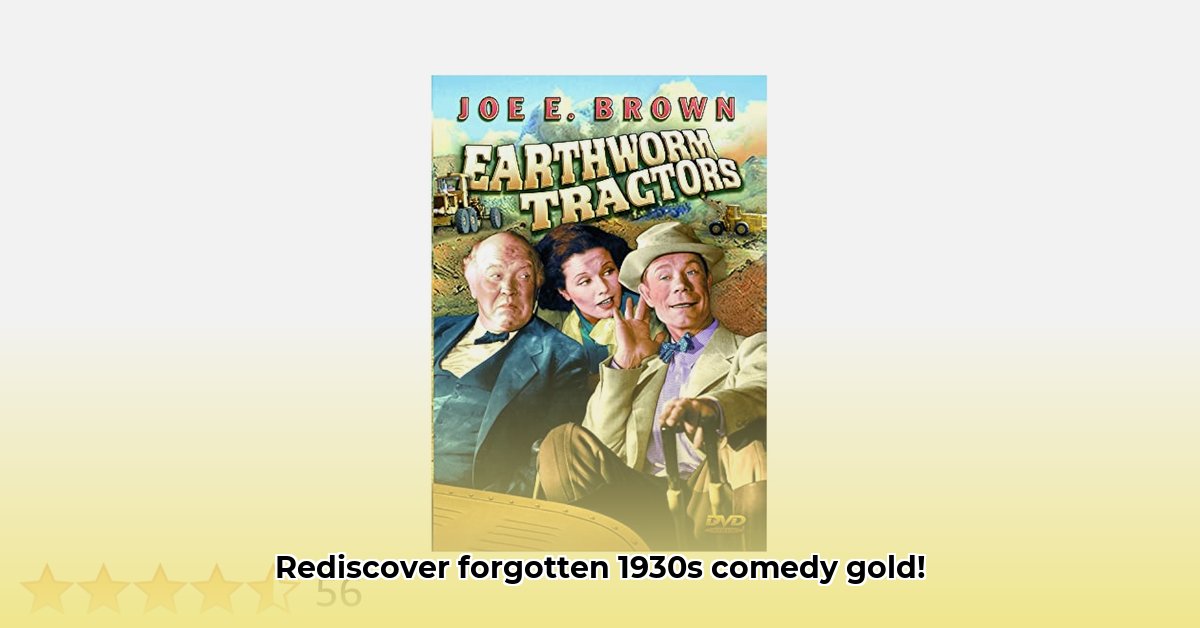
Forget the stuffy, predictable comedies of the era; Earthworm Tractors (1936) is a delightful anomaly, a surprisingly relevant and uproarious time capsule from the heart of the Great Depression. This public domain film, adapted from popular short stories, cleverly uses familiar character archetypes and witty slapstick to explore the chaotic world of sales, offering a unique blend of humor and societal commentary. But its public domain status presents a crucial challenge: how do we ensure its survival for future generations? This essay will explore Earthworm Tractors’ unique charm, analyzing its narrative, its reflection of the American Dream, and the urgent need for its preservation. For more on early 20th-century agricultural machinery, see this site on early tractors.
A Surprisingly Modern Comedy
Earthworm Tractors isn’t just a historical artifact; its enduring appeal lies in its surprisingly modern sensibilities. The film centers on Alexander Botts, an optimistic salesman whose struggles to sell, of all things, earthworm tractors, resonate deeply even today. His battles with skeptical farmers mirror the perennial challenges of introducing new technologies into a resistant market, offering a timeless commentary on innovation and consumer acceptance. Isn't it intriguing how a nearly century-old film manages to capture such universal struggles with such enduring comedic effect? The film’s humor stems from relatable situations and familiar character interactions, making it surprisingly accessible to modern audiences despite its age. This blend of slapstick and subtle social commentary is what makes Earthworm Tractors a truly unique comedic gem.
The Public Domain Paradox: Accessibility vs. Preservation
The film's public domain status is a double-edged sword. On one hand, it guarantees widespread accessibility, allowing anyone to view and enjoy it. However, this very accessibility has paradoxically hindered its preservation. Numerous copies exist, but many are in poor condition, raising serious concerns about the long-term survival of this comedic masterpiece. This highlights a larger problem facing the preservation of public domain films: how do we ensure their survival when their very accessibility reduces the incentive for dedicated preservation efforts? This is a question that deserves urgent attention from film archivists and historians alike. The sheer number of existing copies, many in degraded condition, underscores the pressing need for a coordinated effort to preserve this significant piece of cinematic history.
More Than Just Laughs: A Reflection of the 1930s
Beyond the slapstick and witty dialogue, Earthworm Tractors offers a subtle yet insightful reflection of the 1930s' social and economic landscape. The film, in its portrayal of the struggles faced by inventive companies, subtly captures the tensions and uncertainties of a nation grappling with technological advancements and economic hardship. The film's humorous depiction of salesmanship and the challenges of convincing a reluctant consumer base serves as a revealing commentary on the era’s shifting social norms and expectations. It's a testament to the film's enduring power that these themes continue to resonate deeply with audiences today despite the passage of decades. Further research is needed to fully unpack the film's nuanced social and economic commentary. Did the film accurately reflect audience attitudes towards innovation and salesmanship at the time, or did it offer a more critical perspective?
Unearthing the Untold Story: Areas Needing Further Research
Despite its age and accessibility, a comprehensive scholarly analysis of Earthworm Tractors remains surprisingly absent. Significant gaps exist in our understanding of its reception by contemporary audiences, its stylistic influences, and its broader cultural impact. What did critics think of the film upon its release? How did it compare to other comedies of its time? How did the film's narrative impact audiences' perception of salesmanship and innovation? These are crucial questions that require further investigation. The film represents a vital opportunity for film historians to further our knowledge of the cultural production of the 1930s.
A Call to Action: Preserving a Cinematic Legacy
The preservation of Earthworm Tractors is more than just a matter of saving an old movie; it's about safeguarding a vital piece of cinematic and cultural heritage. It's a reminder that even seemingly simple comedies can hold surprising depth and offer valuable insights into the past, highlighting the importance of a collaborative and multifaceted approach to film preservation. The film's survival depends on a coordinated effort involving film archivists, historians, distributors, and the broader community of film enthusiasts.
A Three-Pronged Strategy for Preservation
To effectively preserve Earthworm Tractors and other public domain films, a multi-pronged approach is crucial:
High-Quality Digitization and Archiving: Creating multiple high-resolution digital copies using open-source formats safeguards against data loss and technological obsolescence. These copies should be stored in multiple secure locations.
Physical Preservation of Original Materials: Original film reels, despite their deterioration, retain significant historical value. Proper storage and occasional restoration are essential for maintaining their integrity.
Community Engagement & Educational Initiatives: To ensure the film’s continued relevance, collaborative projects can be undertaken to bring the film to wider audiences, promote its cultural significance, and encourage public support for preservation efforts.
The Rediscovery of Earthworm Tractors is not merely about preserving a single film; it is about championing a model for ensuring the long-term survival of our collective cinematic heritage.